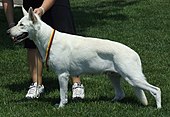Health

Many of the common health issues in German Shepherds stem from the inbreeding practices that occurred early in the breed’s history. One prevalent issue is hip and elbow dysplasia, which can lead to pain and arthritis as the dog ages. A study by the University of Zurich revealed that 45% of police working dogs suffered from degenerative spinal stenosis, though the study had a small sample size. Additionally, the Orthopedic Foundation for Animals found that 19.1% of German Shepherds are affected by hip dysplasia.
Several studies have shown that the life expectancy of German Shepherds is generally lower than the average for other dogs. A 2024 UK study found their average lifespan to be 11.3 years, compared to 12 years for crossbreeds and 12.7 years for purebreds. A 2022 UK study using veterinary records reported a life expectancy of 10.16 years, compared to 11.23 years overall and 11.82 years for crossbreeds. In Italy, a 2024 study found a life expectancy of 10 years, matching the overall average but lower than the 11-year average for crossbreeds. A 2005 Swedish study, based on insurance data, showed that 51% of German Shepherds died by the age of 10, lower than the overall survival rate, which was 35% at 10 years. A 2015 French study reported a life expectancy of 10.08 years for German Shepherds.
German Shepherds are also more prone to degenerative myelopathy, a condition caused by a mutation in the SOD1 gene. A small UK study found that 16% of young, asymptomatic German Shepherds were homozygous for this mutation, while 38% were carriers.
In addition, German Shepherds have a higher incidence of Von Willebrand disease, an inherited bleeding disorder, and exocrine pancreatic insufficiency (EPI), a degenerative disease of the pancreas. It’s estimated that 1% of German Shepherds in the UK suffer from EPI.
Musculoskeletal Issues
Musculoskeletal disorders in German Shepherds can be debilitating, often linked to genetics, malnutrition, or stress. These dogs are predisposed to various skeletal issues, including hip dysplasia, Cauda equina syndrome, and osteoarthritis.
Canine hip dysplasia (CHD) occurs when the hip joint and surrounding tissue develop abnormally, leading to joint instability, partial dislocation, pain, inflammation, lameness, and possibly osteoarthritis. A North American study analyzing over a million hip scans and 250,000 elbow scans in dogs over two years old found that 18.9% of German Shepherds had hip dysplasia, and 17.8% had elbow dysplasia. German Shepherds ranked 8th for hip dysplasia and 6th for elbow dysplasia. Another North American study found that 10.26% of German Shepherds seen at teaching hospitals had hip dysplasia, compared to 3.52% overall.
Pituitary Dwarfism
Pituitary dwarfism, also known as congenital hyposomatotropism, is an autosomal recessive disorder seen in German Shepherds. This condition leads to growth retardation, where the puppy coat persists into adulthood, and guard hairs fail to fully develop, resulting in full alopecia over time. The severity of growth retardation and other symptoms varies among affected dogs.
Research from 1978 traced the mutation to 1940 or earlier. Some champion German Shepherds have been carriers of this mutation, contributing to the spread and prevalence of the disorder. This condition has also been observed in breeds crossed with German Shepherds, such as the Karelian Bear Dog, Saarloos Wolfhound, and Czechoslovakian Wolfdog. Pituitary dwarfism is extremely rare in breeds without German Shepherd ancestry.
Unlike in humans, where POU1F1 and PROP1 gene mutations cause similar defects, in German Shepherds, the condition is linked to a mutation in the LHX3 gene. The University of Utrecht offers a genetic test for this defect. Untreated dogs with this condition typically live between 3-5 years. However, with treatment, they can live several healthy years, though they are still unlikely to reach a normal life expectancy.

